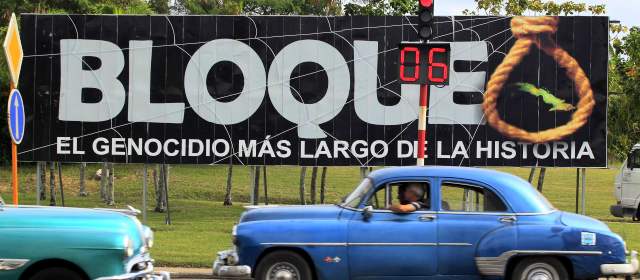U.S. blockade remains in effect
Granma | Friday, 15 January 2016 | Click here for original article

Since December 17 of 2014, the Obama administration has taken a series of steps to modify the implementation of the blockade, but the impact has been minimal thus far.
Many aspects require Congressional action, although there is still much the President can do, using his broad executive powers
Below are some of the actions taken to date by President Obama:
1. The 12 categories of U.S. citizens permitted to travel to Cuba can do so now under a general license. Travellers are no longer subject to spending limits on the island and can use their credit and debit cards. Approved travellers can be accompanied by their families.
2. In the area of telecommunications, exports of goods and services to Cuba are authorised. The main limitation is the requirement to pay cash in advance.
3. The list of U.S. products which can be exported to Cuba without having to request authorisation from the U.S. Department of Commerce is reduced to telecommunications products and services, construction materials and equipment and tools for the use of the non-state sector, including agriculture.
4. The authorisation to import Cuban goods and services produced by the non-state sector - which excludes key items for the Cuban economy such as tobacco.
5. The modifications to the regulations on maritime transport, which allow for cargo ships carrying humanitarian goods to Cuba to enter U.S. ports before the 180 day limit applied to others - irrelevant since in practice the majority are not limited to transporting food, medicines, medical equipment or other authorised exports.
6. Changes in the financial sphere merely facilitate processing of authorised transactions relating to travel, exports and remittances.
7. The sale to Cuba of products by other countries containing up to 25% U.S. made components is permitted - the previous limit was 10%.
8. The establishment of offices in Cuba by companies approved to have relations with the island was authorised.
Listed next are measures which the President has the authority to implement, to substantially modify the blockade:
1. Authorise the use of the U.S. dollar in Cuba’s international transactions.
2. Permit Cuban entities (banks, companies, etc.) to open corresponding accounts with U.S. banks.
3. End the policy of financial persecution against Cuba, which has included the imposition of fines and sanctions.
4. Allow the granting of credits, loans and finance to Cuba, in order to purchase products from the U.S. market (excluding agricultural products, prohibited by law).
5. Authorise U.S. products to be directly exported to Cuba.
6. Allow Cuba to import products from third countries which contain over 25% U.S. made components.
7. Allow the U.S. to import Cuban products and services which constitute exportable goods key to the Cuban economy, such as tobacco, rum and biotechnology products, including products manufactured in third countries which contain Cuban raw materials such as nickel or sugar.
8. Allow U.S. companies to invest in Cuba.
9. Eliminate the value limit on Cuban goods that U.S. travellers can import from Cuba, for personal use or as gifts.
10. Allow U.S. citizens to receive medical treatment in Cuba.
11. Instruct U.S. representatives in international financial institutions not to impede the granting of credits or other financial services to Cuba.
Five important aspects of the blockade which require Congressional action:
1. Permitting travel for the purposes of tourism (Trade Sanctions Reform and Export Enhancement Act of 2000)
2. The ban on U.S. subsidiaries in other countries trading with Cuba (Torricelli Act)
3. The prohibition on doing business with formerly U.S. owned companies in Cuba which were nationalised (Helms-Burton Act)
4. The obligation to pay cash in advance for purchases of agricultural products from the U.S. (Trade Sanctions Reform and Export Enhancement Act of 2000)
5. The complete elimination of the blockade (Helms-Burton Act)






